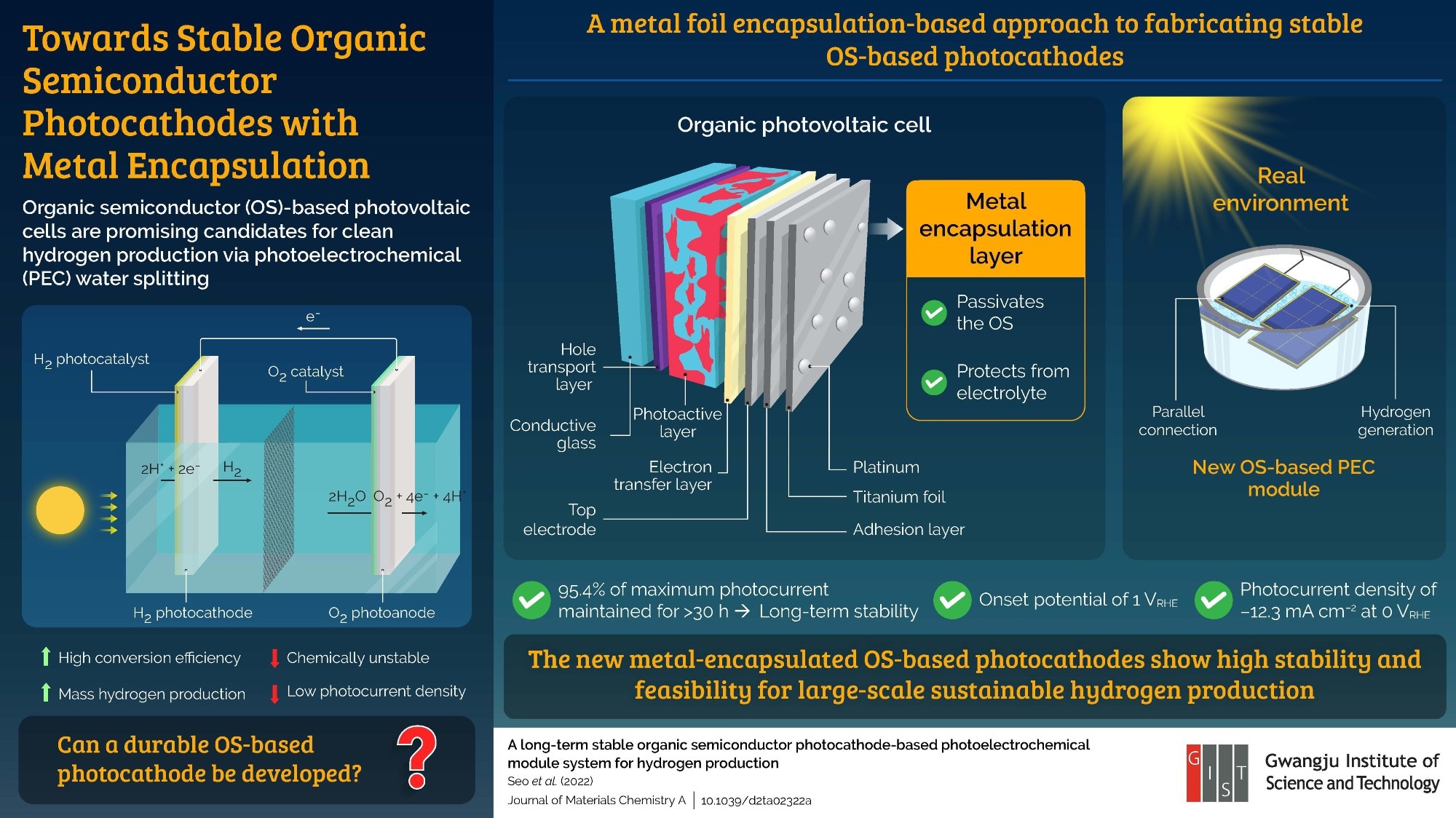Organic semiconductors (OSs) used in organic solar cells show promise as a candidate for facilitating clean hydrogen production from sunlight. However, they suffer from slow charge transfer and chemical instability. Addressing this issue, researchers from Gwangju Institute of Science and Technology use metal foil encapsulation to protect the OS from the electrolyte, greatly enhancing its stability and photocurrent retention as demonstrated in an OS module operation under sunlight.
 Scientists from GIST developed, in a new study, high-efficiency, long-term stable organic semiconductor-based photocathodes that can be used to produce sustainable hydrogen via solar-driven water splitting by encapsulating it with platinum-decorated titanium foil. Image Credit: Sanghan Lee from Gwangju Institute of Science and Technology, Korea
Scientists from GIST developed, in a new study, high-efficiency, long-term stable organic semiconductor-based photocathodes that can be used to produce sustainable hydrogen via solar-driven water splitting by encapsulating it with platinum-decorated titanium foil. Image Credit: Sanghan Lee from Gwangju Institute of Science and Technology, Korea
Hydrogen is emerging as a popular eco-friendly alternative to fossil fuel resources owing to its carbon-neutral combustion products (water, electricity, and heat) and is considered to be the next-generation fuel for a zero-emission society. However, the major source of hydrogen is, ironically, fossil fuels.
One way to produce hydrogen in a clean and sustainable manner is through water splitting driven by sunlight. The process, known as “photoelectrochemical (PEC) water splitting” is the basis of operation of organic photovoltaic cells. What makes this method attractive is that it enables 1) mass hydrogen production in limited space without a grid system and 2) high-efficiency conversion of solar energy to hydrogen. Despite such advantages, however, the photoactive materials used in conventional PECs do not have the properties required for a commercial setting. In this regard, organic semiconductors (OSs) have emerged as a potential photoelectrode material for commercial PEC hydrogen production due to their high performance and low-cost printing. But, on the downside, OSs suffer from poor chemical stability and low photocurrent density.
Now, a team of researchers led by Prof. Sanghan Lee from Gwangju Institute of Science and Technology, Korea, may have finally solved this problem. In their recent breakthrough that appeared on the front cover page of the Journal of Materials Chemistry A, the team adopted an approach based on encapsulating the OS photocathode in platinum-decorated titanium foil, a technique known as “metal foil encapsulation,” to prevent its exposure to the electrolyte solution.
“The metal foil encapsulation is a powerful approach for realizing long-term stable OS-based photocathodes since it helps impede the penetration of electrolytes into the OS, improving their long-term stability as has been demonstrated in our previous studies and other reports on OS-based photoelectrodes, ” explains Prof. Lee. The study was made available online on 14 May 2022 and was published in Issue 25 of the journal on 07 July 2022.
The team fabricated an organic photovoltaic cell, in which the OS photocathode was covered with titanium foil and well-dispersed platinum nanoparticles. Upon testing, the OS photocathode showed an onset potential of 1 V versus the reversible hydrogen electrode (RHE) and a photocurrent density of -12.3 mA cm-2 at 0 VRHE. Most remarkably, the cell demonstrated a record operation stability, retaining 95.4% of the maximum photocurrent for over 30 hours without any noticeable deterioration in the OS. Further, the team tested the module under actual sunlight and was able to produce hydrogen.
The highly stable and efficient PEC module developed in this study can enable large-scale production of hydrogen and inspire innovative routes for building future hydrogen gas stations. “With the growing threat of global warming, it is imperative to develop eco-friendly energy sources. The PEC module explored in our study could be installed in hydrogen gas stations, where hydrogen can be both mass-produced and sold at the same time,” speculates an optimistic Prof. Lee.
We sure hope his vision is realized soon!